CT Post (Batouly Camara, Neag School alumna and former member of the UConn women’s basketball team, is profiled)
Talmadge Named New Westbrook Middle School Principal
Zip06 (Alum Matthew Talmadge featured)
Faculty Assist With New Grant Expanding Neurodiversity Programs
Two new grants from the National Science Foundation, totaling just shy of $1 million, have been awarded to civil and environmental engineering faculty.
The grants focus on the talents of students with ADHD and dyslexia in STEM fields.
Editor’s Note: The following story originally appeared on UConn Today, the University of Connecticut’s news website.

Two new grants from the National Science Foundation (NSF), totaling just shy of $1 million, have been awarded to Civil and Environmental Engineering (CEE) faculty Alexandra Hain and Arash Zaghi for work they will carry out in undergraduate research opportunities and new programs for graduate students in the neurodiversity spectrum. The grants focus on the talents of students with ADHD and dyslexia in STEM fields.
The first grant, funded by the NSF Innovations in Graduate Education program, encourages the participation of neurodiverse students in STEM graduate programs to significantly benefit the creativity of our professional workforce, which in turn will help to identify groundbreaking solutions to the large-scale and complex scientific and technological challenges facing the nation. It will provide several resources, workshops, and tools to neurodiverse graduate students to improve their success in graduate programs and give them skills that prepare them for careers in academia and business. Through the help of Zaghi, Hain, Civil Engineering Professor Richard Christenson, Educational Psychology Professor Joseph Madaus, English Professor Tom Deans, and Literacy Education Professor Rachael Gabriel, the team will be developing a strength profiler tool, creating a peer mentoring program, piloting a technical writing program, and holding stakeholder workshops. This project enjoys the strong support of the dean of the Graduate School, Vice Provost Kent Holsinger, to ensure that its impact goes beyond STEM programs.
The second grant, which is aimed at undergraduate research for students who are neurodiverse, will re-launch and expand on a previous NSF Research Experiences for Undergraduates (REU) that UConn ran for neurodiverse students from 2015-2018. The new 10-week summer program will build on the learnings from the previous program and will recruit juniors and seniors from across the country, to participate in specially designed research projects in the fields of artificial intelligence for storm damage prediction, machine learning for damage assessment of bridges, and several other topics.
The students will present on their projects at the end of the summer and will participate in special seminars, brainstorming sessions, mentorship opportunities, and workshops designed to address the needs and challenges of the neurodiverse participants. Other faculty participating in that program include CEE faculty members Tim Vadas, Jin Zhu, Shinae Jang, Christine Kirchhoff, Emmanouil Anagnostou, and Diego Cerrai.
Learn more about the neurodiversity efforts of the CEE Department.
CEE Department Scores Two New Grants to Expand on Neurodiversity Programs
UConn Today (Neag School’s Joseph Madaus and Rachael Gabriel are mentioned regarding a new NSF grant they will be supporting)
Six UConn Students Receive Fulbright Program Grants
UConn had an all-time high of 17 semifinalists for the Fulbright Student Program award, which includes the six finalists and three alternates. Three of them are affiliated with the Neag School.
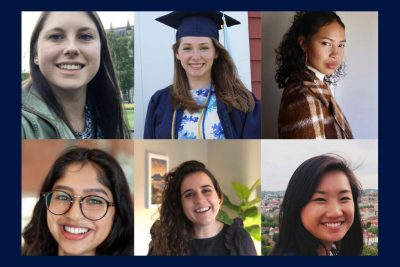
Editor’s Note: The following story originally appeared on UConn Today, the University of Connecticut’s news website.
Six UConn students have been selected as recipients of a grant through the Fulbright U.S. Student Program for the 2021-22 academic year. The program provides grants for individually-designed study and research projects or for English teaching assistantships around the world. Students meet, work, live with, and learn from the people of the host country, sharing daily experiences.
UConn had an all-time high of 17 semifinalists for the Fulbright Student Program award, which includes the six finalists and three alternates. A total of 40 UConn students completed UConn’s campus application process for the 2021-22 Fulbright round.
“In what has been a truly challenging year for all students, and one which witnessed an 11.9% increase overall in applications to the Fulbright Student program, our UConn applicants demonstrated outstanding qualities and their commitment to fostering mutual understanding by engaging with the world,” says LuAnn Saunders-Kanabay, assistant director in the Office of National Scholarships and Fellowships at UConn and the Fulbright Program Advisor. Together with the campus Fulbright committee, she mentors Fulbright applicants through the months-long process.
The six UConn students who are recipients (also referred to as “finalists”) are:
Elizabeth Clifton, a doctoral student in ecology and evolutionary biology, will explore the vast diversity of weapon adaptations in termites in collaboration with the Faculty of Tropical AgriSciences at the Czech University of Life Sciences in Prague. An avid outdoors person, she plans to hike, learn the local flora and fauna, and connect with the citizens of Czechia. Upon her return to the United States, Clifton will defend her dissertation and apply to post-doctoral positions that will enable her to travel internationally for fieldwork and continue scientific collaborations.
Karli Golembeski, a master’s student in curriculum and instruction in the Neag School of Education and a native of New Milford, will travel to Spain for an English teaching assistant grant. Golembeski aspires to a future as a Spanish language educator with the goal of fostering the prioritization of foreign language study in American schools. Her experience as an English teaching assistant in the Galicia region will provide an immersive experience outside of metropolitan areas, enabling her to engage with cultural traditions in smaller communities and represent American culture in Spanish classrooms.
Chloe Murphy ’21 (CLAS), was an Africana Studies major from New London, with an abiding interest in Lusophone society and the African diaspora. She will travel to Brazil for an English teaching assistant grant and seeks to teach English and experience a part of the world which has a comparable yet contrasting history to the United States. Murphy looks forward to learning the history and exploring the architecture of the community while sharing her American perspective. When she returns to the United States, Murphy will pursue a master’s in education, to teach history at the high school level in an urban setting, and eventually move into administration.
Simran Sehgal ’21 (ENG) was a biomedical engineering major with an interest in the forces of culture, economics and politics that shape the dynamics of our technological environment and received a Fulbright Study grant to the Netherlands. She has been accepted at Maastricht University to pursue a master’s in European studies on society, science, and technology, where she will focus on science and public policy to examine the relationship between contemporary governance and technological innovations. Upon completion of her master’s, Sehgal will return to attend medical school with a dual master’s program in health services and policy research.
Jessica Stargardter ’16 (ED) ’17 MA, received her master’s in curriculum and instruction and will travel to Finland for a Fulbright Research grant. A native of Windsor, she earned a certificate in Gifted Education and Talent Development in 2019 and has been working as a gifted and talented teacher for the Norwalk Public Schools since 2018. In collaboration with faculty at the University of Helsinki, her research project will examine how teachers in Finnish schools provide services to gifted immigrant students. Upon completion of her research, Stargardter will share the results with practitioners in Finland and the U.S. through conferences, professional development, and publications.
Candace Tang ’21 (CLAS) was a double major in sociology and human development and family studies with an interest in the creative arts and will travel to Taiwan for the ETA grant. A native of Simsbury, Tang seeks to develop a new strategy of language-learning as an English Teaching Assistant in Taiwan by engaging with local artists and story-telling projects. Upon her return, Tang will pursue a master’s program in social work with a focus on serving international students in higher education.
UConn students named alternates for a Fulbright grant were:
Amir Agoora ’21 (CLAS), an English major; Olasubomi (Mini) Ajayi ‘21 (CAHNR), an allied health major; and Jonathan Simmons, a doctoral student in the curriculum and instruction in the Neag School of Education.
UConn students named semifinalists for a Fulbright grant were:
Jessica Adams ‘20 (CLAS), a biology major; Jolene Addi ’21 (CLAS), a psychological sciences major; Mia Flynn ’21 (CLAS), an economics major; Brendan Hogan ‘21 (CLAS), with majors in political science, philosophy and psychological sciences; Brianna McClure ‘19 (CLAS), a political science major; Shankara Narayanan ‘21 (CLAS), a history and political science major; Magdalena Pawlowski, a master’s in fine arts student in painting; Isaiah Williams ‘17 (ENG), an environmental engineering major.
Operating in over 140 countries worldwide, the Fulbright Program is the flagship international educational exchange program sponsored by the U.S. Department of State’s Bureau of Educational and Cultural Affairs (ECA) and is designed to increase mutual understanding between the people of the United States and the people of other countries.
The Office of National Scholarships & Fellowships (ONSF) is a resource for students interested in learning more about the Fulbright U.S. Student Program and other prestigious externally-funded scholarships and fellowships that support both graduate and undergraduate study. ONSF is part of Enrichment Programs and is open to all graduate and undergraduate students at the University, including students at the regional campuses. For more information about Fulbright specifically, contact LuAnn Saunders-Kanabay, UConn’s Fulbright Program Advisor.
Six UConn Students Receive Fulbright Program Grants
UConn Today (A Neag School grad and current student are among the recipients)
UCAPP Projects Engage Families in Supporting Student Learning
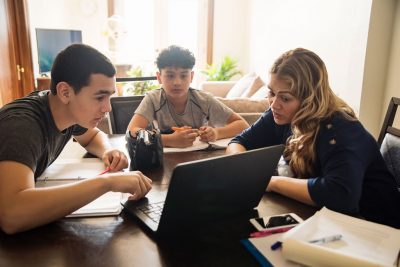
Seventh Annual Change Project Day Features the Work of 2021 UCAPP Grads
Neag School of Education students completing the UConn Administrator Preparation Program (UCAPP) this spring recently presented their capstone projects – the program’s signature final assignment in which students identify a need or opportunity for school improvement and work toward positive change.
During the seventh annual Change Project Day, held virtually last month, UCAPP students had the opportunity “to synthesize and translate to practice everything they’ve learned in the coursework and observed or practiced during the clinical practicum,” says Richard Gonzales, associate professor-in-residence and director of the Neag School’s Educational Leadership Preparation Programs. “It is a structured opportunity to test knowledge and theory in the real world,” he adds.
The UCAPP program went through a redesign in 2020 as part of a nationwide effort known as the University Principal Preparation Initiative (UPPI), funded by the Wallace Foundation. As a result of the redesign, the concept of family and parent engagement became a priority for the first organizational leadership course in UCAPP’s program of study.
Gonzales notes the importance of connecting with parents, pointing out that “effective school leaders proactively seek to work with parents as partners to support student learning.”
Three of the students’ capstone projects focused on parent engagement and were carried out with support from the Hartford Foundation for Public Giving.
“You can create a culture that makes everyone – including families and community partners – feel like they are essential to the fabric of the school community — because they are,” Shuana Tucker, chief talent officer with the Connecticut State Department of Education (CSDE) and former UCAPP adjunct professor told UCAPP grads in her Change Project Day address.
Parent University Night
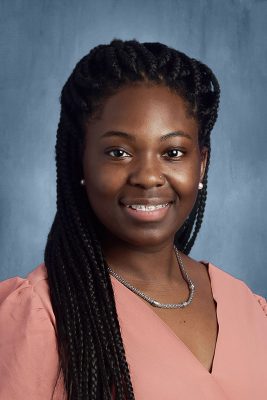
One capstone project, designed and implemented by UCAPP student Kenterra Carrion, a school social worker for Hartford (Conn.) Public Schools, focused on “building trust, open communication, and positive relationships as a school community.”
The project, titled “Parent University Night,” was hosted by Pathways Academy of Technology and Design, located in East Hartford, Connecticut, to help parents navigate technology and applications their children use during remote learning, while offering support during this unprecedented time as students progress through high school.
The Parent University Night included five sessions, taught by teachers and one parent, on such topics as the effects of COVID-19 on the whole child; suicide prevention; personal wellness; college and career readiness; and social media.
Carrion says she sees parents as an “essential part of building a positive school community, as they are active participants in the learning and development of the whole student inside and outside of school.”
“When parents lead initiatives, communicating with one another about student opportunities and engaging in meaningful conversations with stakeholders, students gain a network of support, encouragement, and inspiration,” she adds.
Carrion wanted her project to represent a commitment to their schools’ students and their “village.”
“As part of the desired outcome of the project, the parents will have an opportunity to build reciprocal relationships, to develop trust and open communication,” she says.
Staff and parents plan to build upon this initiative by hosting another Parent Engagement Night next school year.
Partners in Learning
Nicole Selmanie, an eighth-grade mathematics educator for Burr Middle School in Hartford, led her school’s Family, School, and Community Engagement Committee (FCSE) this past year.
“Parents want the best for their children. We believe they are always willing to support their child’s learning, and thus are the best partners,” says Selmanie. “Research has shown that family involvement in a child’s education matters. It’s essential for our students to reach their full potential that teachers and families are on the same page.”
“Research has shown that family involvement in a child’s education matters. It’s essential for our students to reach their full potential that teachers and families are on the same page.”
— Nicole Selmanie ’12 MSW, ’21 6th Year
Through her leadership as a UCAPP student, the FSCE had been analyzing data on school climate and family input, which led the committee to focus partnering with families to improve student learning. The data revealed a disconnect between families, staff, and students in terms of partnering to support student learning.
The project developed by Selmanie included researching, recommending, and having the school install a new communication platform, Class Dojo. The platform provides a streamlined communication system accessible to all members of the school community, regardless of their preferred language.
In addition, her project involved incentivizing family participation in Learning Night and other events. Learning Night, which will be held in June, will provide the opportunity to collectively create a system for staff and families to support student learning. Leading up to Learning Night, students on the FCSE have been hosting Student Voice Sessions to gather student feedback on their needs and insights into their learning.
Selmanie says her UCAPP experience has taught her how to be an administrator and given her practice being one, too. In addition to UCAPP’s redesign focus on parent engagement, she found the emphasis on equity and anti-racism key to her decision to join the program.
“This solidified my choice and was the only program I applied to,” she says.
Collaboration With Parents
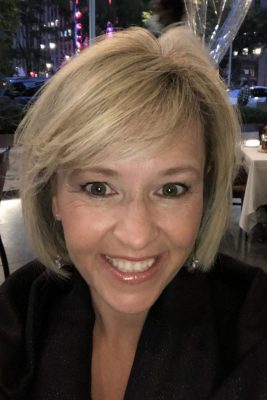
Sherry Farmer, a special education teacher at Jeffrey Elementary School in Madison, Connecticut, also focused on parents for her UCAPP capstone project. She says she realized that more affluent communities like Madison still need to focus on family engagement, even though it’s “easy to assume that it’s not an issue there.”
“It became apparent during the pandemic that there is more work to be done in making parents true partners in our work so they can understand the ‘why’ behind educational and curriculum decisions and feel confident in their ability to support their children,” Farmer says.
The initial idea for the project came from parent survey feedback from the school district in the spring of 2020, when schools first closed due to the pandemic. Parents, Farmer says, “indicated feelings of frustration and misunderstanding surrounding curriculum, instruction, and how to support their children in this new model of teaching and learning.”
Farmer’s project included reviewing data from parent surveys and working with a team of educators across the district to determine next steps. They collectively decided to begin with live webinar series addressing six specific topics during the first trimester of the school year. From follow-up surveys, they discovered that while parents appreciated the webinars, parents of kindergarteners indicated a need for more specific support in foundational reading skills, and parents of juniors and seniors wanted more insights into college readiness.
Many families in the district have the economic means to hire external college counselors. Still, some felt lost in the process or were unable to afford that support. Panels on “Navigating the College Selection Process” were designed to feature various types of higher education institutions (a local Connecticut college, a Big Ten school, a community college, and a trade school). These panels were converted to webinars and shared with the high school students and their parents.
“I was hesitant to take on a project this large in scale, but it turned out to be one of the best learning experiences I had while in the UCAPP program.”
– Sherry Farmer ’21 6th Year
Webinars focused on literacy and reading skills were sent to the kindergarten parents, with students receiving packets to take home that included copies of all the games presented in the videos and a book that allowed them to practice various skills.
Originally, the project was going to serve Jeffrey Elementary exclusively, but the assistant superintendent invited Farmer to involve the district as a whole.
“Initially, I was hesitant to take on a project this large in scale, but it turned out to be one of the best learning experiences I had while in the UCAPP program,” she says.
The school district is already looking ahead to next year, when it hopes to continue sharing the webinars.
Reflecting on the program during Change Project Day, Tucker of the CSDE recommended to the future administrators that they “welcome and foster … relationships, keep an open mind and your ear to the group, because staying connected to the community you serve will benefit your work in the long run, sometimes in ways you may never expect.”
‘The Beginning is in Sight,’ Cardona Tells UConn Graduates
UConn Today (Neag School alumnus and U.S. Secretary of Education Miguel Cardona is featured)
For 4-H Leaders and Neag Student, Learning is a Lifelong Process
UConn Today (Rachael Manzer, a doctoral student in curriculum and instruction, is featured)
Year-End Neag School Accolades: 2020-21
Throughout the academic year, the Neag School is proud to share the latest achievements of its faculty, staff, students, and alumni.
Explore their most recent promotions, awards, retirements, publications, and more:
- Dean’s Office
- Department of Curriculum and Instruction and Teacher Education
- Department of Educational Leadership
- Department of Educational Psychology
- Faculty/Staff
- Students
- Alumni
- In Memoriam
Dean’s Office
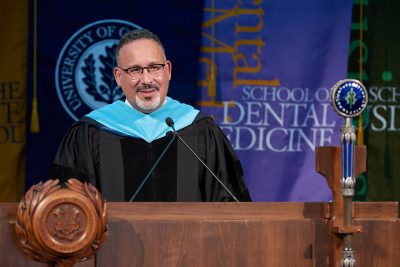
The Neag School celebrated the Class of 2021 during the University’s in-person Commencement ceremonies at the Pratt and Whitney Stadium in May, which included UConn’s keynote speaker, Neag School alumnus and U.S. Secretary of Education Miguel Cardona ’01 MA, ’04 6th Year, ’11 Ed.D., ’12 ELP.
- Read the full story in UConn Today.
- Watch the undergraduate ceremony.
- Check out photos from Commencement Week.
- Faculty and staff also shared well wishes with the Class of 2021 via video:
U.S. News & World Report issued its 2022 rankings of the best graduate schools of education in the nation, with the Neag School ranking among the top 20 public graduate schools of education in the United States for the sixth consecutive year. In addition, one of Neag School’s Special Education program stands among the top 20 in the U.S., tied at No. 13.
Faculty Promotions
During its May faculty/staff meeting, Interim Dean Jason Irizarry congratulated the following Neag School faculty members on their promotions, effective in August:
- Milagros Castillo-Montoya — Promoted to associate professor with tenure
- Robin Grenier — Promoted to professor
- H. Kenny Nienhusser — Promoted to associate professor with tenure
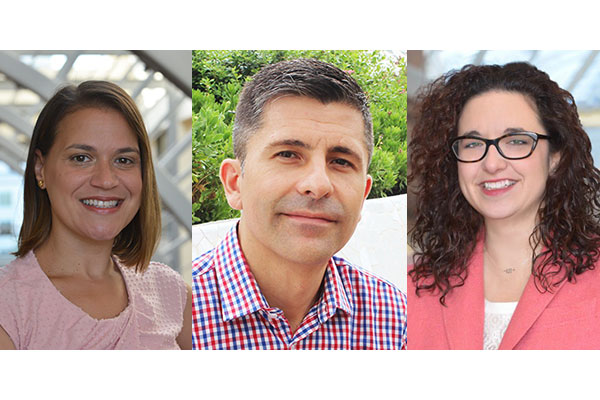
Neag School Awards
Also honored were the winners of the following 2021 Neag School awards:
- Jonathan Simmons, David Blick Science Education Award — Named in honor of the late David James Blick Jr., a former UConn chemistry professor, this award recognizes innovative and/or collaborative efforts in science education by the University or its graduates.
 Jamison Judd, Valerie J. Pichette Outstanding Staff Award — Launched in 2021, this award is named in honor of the late Valerie J. Pichette, who had a 30-year history of service to the state of Connecticut, including having served as executive assistant to the Neag School dean for nearly two decades. This award recognizes an individual who has gone above and beyond in their work at the Neag School over the past academic year.
Jamison Judd, Valerie J. Pichette Outstanding Staff Award — Launched in 2021, this award is named in honor of the late Valerie J. Pichette, who had a 30-year history of service to the state of Connecticut, including having served as executive assistant to the Neag School dean for nearly two decades. This award recognizes an individual who has gone above and beyond in their work at the Neag School over the past academic year.- Suzanne Wilson and Brandi Simonsen, Distinguished Researcher Award — This award honors a senior-level investigator at the Neag School who, over at least the past 10 years, has made significant research contributions to their field of study.
- Emily Tarconish — This award is given to an outstanding student whose research during study with the Neag School of Education demonstrates a pattern of excellence, which represents potential to make an impact in their field of study upon graduation.
UConn Gives 2021, the University’s 36-hour fundraising campaign, was an overwhelming success. This year’s top project was the Bill Servedio Scholarship Fund, which supports students in UConn’s Sport Management Program by offsetting costs associated with professional learning such as internships and professional conferences. More than 630 people donated to this project. Overall, the Neag School received $51,754 in donations from 889 donors. Read about the Neag School’s Giving Day efforts.
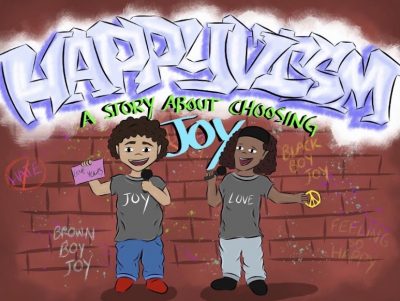
UConn Alumni hosted #ThisIsAmerica: Representation Matters with Project Happyism virtually in March. The family-friendly event, which showed participants how to have meaningful conversations around representation, included Neag School alumnus Justis Lopez ’14 (ED), ’15 MA and welcome remarks from Interim Dean Jason Irizarry. Read more about the event.
E.B. Kennelly School of Hartford, Connecticut, celebrated “UConn Day” to recognize the Neag School’s student teachers. The annual event also brings awareness and excitement among Kennelly students’ about attending college. Festivities included a student parade around the school grounds and a pep rally led by UConn’s mascot Jonathan. Check out photos from the event.
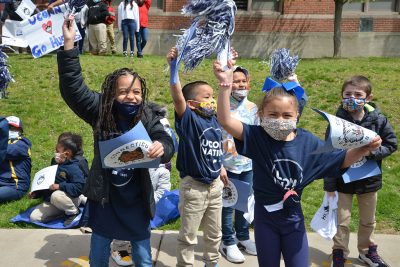
The Neag School co-sponsored the Connecticut Student Writers Student Recognition Night, held virtually in May. Jason Courtmanche ’91 (CLAS), Ph.D. ’06, Neag School alumnus and director of the Connecticut Writing Project, gave the welcome introduction.
Department of Curriculum and Instruction (EDCI) and Teacher Education
Cara Bernard and Joseph Abramo will lead a new master’s program in curriculum and instruction with a concentration in music education next year; the program was recently approved by the University.
The Environment Corps (“E-Corps”) held two workshops in April focused on E-Corps’ structure, operation, results, and early lessons learned. E-Corps, an interdisciplinary effort supported by a $2.25 million NSF grant, is co-sponsored by the Neag School and involves Todd Campbell as principal investigator, Rebecca Campbell-Montalvo, as well as Byung-Yeol Park ’21 Ph.D. and Ph.D. student Hannah Cooke, as part of the research team.
Participants from this spring’s Leadership in Diversity (L.I.D.) Conference listen to presentations during the annual event.Leadership in Diversity (L.I.D.) hosted a virtual conference titled “Rewriting the Blueprint: Building a Community of Care” in March.
Department of Educational Leadership (EDLR)
The Center for Education Policy Analysis, Research, and Evaluation (CEPARE) hosted a Speaker Series in April featuring Thurston Domina from the University of North Carolina at Chapel Hill, who spoke on the academic consequences of diversity-driven school reassignments. View the recording.
The Sport Management program hosted a “Beyond the Field” virtual event in April on “Sport for Development and Peace.” The panel discussion co-moderated by Neag School’s Eli Wolff with innovator and changemaker Pharlone Toussaint featured the following panelists: alumna Batouly Camara ’19 (ED), ’20 MA, founder and CEO of WAKE; Sarah Hillyer, director of the Center for Sport, Peace, and Society at the University of Tennessee; and Richard Loat, co-editor of The Journal of Sport for Development. Held in recognition of the International Day of Sport for Development and Peace, which takes place annually on April 6, the event focused on the credibility and legitimacy of sport for development and peace in policy and practice. View a recording of the panel discussion.
Department of Educational Psychology (EPSY)
A trio of UConn researchers, including the Neag School’s Sandra Chafouleas as a principal investigator, have received a $2.5 million grant from the National Institutes of Health to develop a network to address knowledge gaps on the topic of emotional wellbeing, an emerging public health concern. Learn about the project.
Ido Davidesco is principal investigator on a new $1.4 million National Science Foundation grant, working with an interdisciplinary group that includes Neag School faculty Bianca Montrosse-Moorhead, Christopher Rhoads, and John Settlage, and Aaron Kyle of Columbia University. Read more about the grant.
Faculty/Staff
Dorothea Anagnostopoulos, Suzanne Wilson, and Sian Charles-Harris, a doctoral student in curriculum and instruction, co-published “Contesting Quality Teaching: Teachers’ Pragmatic Agency and the Debate About Teacher Evaluation” for the February issue of Teaching and Teacher Education.
Michele Back was selected as one of two recipients of the American Educational Research Association (AERA) Second Language Research (SLR) Special Interest Group (SIG) Mid-Career Award. She gave remarks during the virtual AERA Annual Meeting in April. In addition, Back, Doug Kaufman, and David Moss co-published “Enhancing Orientation to Cultural Difference: The Role of Re-entry Work for Teacher Candidates Studying Abroad” for the April issue of Journal of Research in Childhood Education.
Todd Campbell co-authored “Are There Differences in How People Are Affected by the COVID-19 Pandemic in the United States? If So, Why Are There Differences, and What Should We Do About the Disproportionate Impact of COVID-19” for the April issue of National Science Teaching Association. Campbell also co-authored, with former Neag School postdoctoral students Jonathan Hall and Lisa Lundgren, “Re-Designing Infrastructure as a Strategy for Crafting Coherence Across Three Networks Focused on the Implementation of the Next Generation Science Standards” for the March issue of Journal of Research in Science Teaching. In addition, he co-published “The Journal of Science Teacher Education in 2020: Striving for a Sentient Presence in Turbulent Times” with Byung-Yeol Park ’21 Ph.D. and other colleagues.
Rebecca Campbell-Montalvo led an American Association for the Advancement of Science (AAAS) workshop titled “IUSE Builds Community Around Improving Undergraduate STEM Education,” virtually in March. Campbell-Montalvo also co-hosted another virtual workshop, “Responses to COVID-19: Adapting Classroom Teaching Techniques and Hands-On Learning to an Online Environment,” for AAAS in March.
Tutita Casa was featured in a March issue of the Marshall Memo for her research article titled “Mathematics Teacher: Learning & Teaching PK-12.”.
Milagros Castillo-Montoya and Saran Stewart received an “Honorable Mention” in the category of Outstanding Publication Award from the AERA’s Division J for their special issue co-authored publication, “Black Deprivation, Black Resistance, and Black Liberation: The Influence of #BlackLivesMatter (BLM) on Higher Education.” The article also appeared in the first edition of Black Liberation in High Education (Routledge, 2021), which they co-edited. Castillo-Montoya and Jillian Ives ’12 MA, a doctoral student in educational leadership, also co-authored “Instructors’ Conceptions of Minoritized College Students’ Prior Knowledge and Their Related Teaching Practices” for the March issue of The Journal of Higher Education.
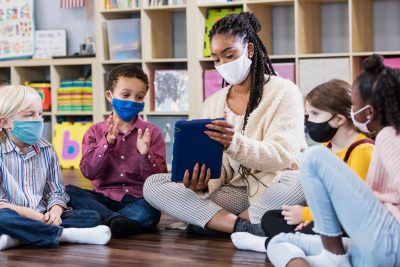
Sandra Chafouleas released her latest blog post, “Spring Is Time for a Check-Up on Family Well-Being,” for Psychology Today. She also published “Bringing ‘Behavioral Vaccines’ to School: Five Ways Educators Can Support Student Well-Being” for The Conversation. Chafouleas, with alumna and postdoctoral research associate Emily Iovino 15 (ED), ’16 MA, ’20 Ph.D., co-wrote “Comparing the Initial Impact of COVID-19 on Burden and Psychological Distress Among Family Caregivers of Children With and Without Developmental Disabilities” for the January issue of School Psychology. Chafouleas also co-authored with UConn’s Jennifer Dineen, Betsy McCoach, and alumni Amy Briesch ’05 MA, ’09 6th Year, ’09 Ph.D.; Sarah Newton ’18 MA, ’20 Ph.D.; and Dakota Cintron ’20 Ph.D. “Exploring Social, Emotional, and Behavioral Screening Approaches in U.S. Public School Districts” for the March issue of American Educational Research Journal.
Clewiston Challenger participated in a new video series titled “Making Voices Heard: Diversity Disadvantage, and Discrimination in Educational Settings,” hosted in April by the UConn Center for the Study of Culture, Health, and Human Development.
Michael Coyne, Betsy McCoach, alumna Sharon Ware ’11 Ph.D., and another colleague co-published “Reframing Adherence: Active Ingredients and Impromptu Interactions That Support Vocabulary Implementation Effectiveness” for the 2021 issue of Early Childhood Research Quarterly. Coyne also provided testimony on reading legislation in Connecticut.
Ido Davidesco presented “Brain-to-Brain Synchrony in the Classroom” for UConn’s Brain Imaging Research Center in March. He also was featured on a recent EdSurge podcast episode titled “What Can Teachers Learn From Students’ Brainwaves?”
Danielle Filipiak co-edited “Intergenerational Inquiry: Literacies of Activism and Desire in a Youth Research Collaborative” for the March issue of Review of Education, Pedagogy, and Cultural Studies.
Rachael Gabriel published “The Sciences of Reading Instruction” for the May issue of Educational Leadership.

Nicholas Gelbar and Joseph Madaus are co-authors, with several other colleagues, of a new study recently published in the Journal of Postsecondary Education and Disability that examined the impact of the rapid transition to online learning during the spring 2020 academic semester on college students with disabilities. Read about the study, featured by UConn Today.
Doug Glanville was featured in an on-air interview titled “Former MLB Player, Analyst, Writer, Educator, and Author Doug Glanville Explores the Intersection Between Sports and Larger Society” with WBGO in April.
Preston Green co-published “Covenants to Discriminate: How the Anti-LGBT Policies of Participating Voucher Schools Might Violate the State Action Doctrine” for the April issue of the University of New Hampshire Law Review. Green also participated in a virtual panel “NEPC Talks Education: Discussing COVID-19 Relief Funds, School Vouchers, and Reparations” for the National Education Policy Center in March.
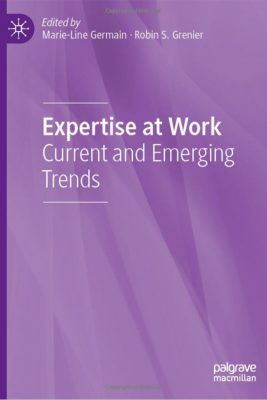 Robin Grenier co-edited the book Expertise at Work: Current and Emerging Trends (Palgrave Macmillan, 2021).
Robin Grenier co-edited the book Expertise at Work: Current and Emerging Trends (Palgrave Macmillan, 2021).
Elizabeth Howard, in partnership with Abt Associates, Public Charter Schools of New Mexico, Dual Language Education of New Mexico, and New Mexico Public Education Department, recently released the New Mexico Charter Schools Study: Findings Report. The report includes theories of change/logic models for both charter schools and dual language education programs.
James Kaufman co-edited Creativity: An Introduction (Cambridge University Press, 2021) and co-published a chapter for An Overview of Creativity Theories. Kaufman also co-published “Meta-Intelligence: Understanding, Control, and Interactivity Between Creative, Analytical, Practical, and Wisdom-Based Approaches in Problem Solving” for the April issue of Journal of Intelligence; “Norming the Muses: Establishing the Psychometric Properties of the Kaufman Domains of Creativity Scale” for the March issue of Journal of Psychoeducational Assessment; and “I Didn’t Have Time! A Qualitative Exploration of Misbehaviors in Academic Contexts” for the March issue of Journal of Academic Ethics.
Devin Kearns and alumnus Stephen Kilgus ’06 (CLAS), ’07 MA, ’11 6th Year Diploma, ’11 Ph.D. contributed to The Next Big Thing in Learning and Behavioral Disabilities (Emerald Insight, 2021).
Gladis Kersaint contributed a chapter titled “Importance of Diversity in STEM” to the State of Black Women and Girls in 21st Century America: Analysis of Challenges and Opportunities for the Congressional Caucus on Black Women and Girls. Kersaint also co-published with Rebecca Campbell-Montalvo and others “The Influence of Expressive and Instrumental Social Capital From Parents on Women and Underrepresented Minority Students’ Declaration and Persistence in Engineering Majors” for the March issue of International Journal of STEM Education.
Tamika La Salle is the new editor-in-chief for the International Journal of School and Educational Psychology (IJSEP), the official journal of the International School Psychology Association. Melissa Bray is an associate editor for the journal. La Salle also participated with the IJSEP’s Youth Mental Health Twitter Chat in May, hosted by Routledge.
Catherine Little was a featured presenter for the National Association for Gifted Children’s 67th Annual Convention, held virtually in March.
Allison Lombardi presented a virtual session titled “High School Implementation: Supporting College and Career Readiness Through PBIS,” for the Association for Positive Behavior Support’s national conference in March. Listen to a UConn 360 podcast episode featuring Lombardi speaking on this topic.
Betsy McCoach, alumna Sharon Ware ’11 Ph.D., Michael Coyne, and others co-published “Effects of Spanish Vocabulary Knowledge on the English Word Knowledge and Listening Comprehension of Bilingual Students” for the March issue of International Journal of Bilingual Education and Bilingualism.

H. Kenny Nienhusser is a guest co-editor for “Policy Implementation as an Instrument to Achieve Educational Equity in the Community College Context” for Educational Policy Analysis Archives. Nienhusser also co-presented with Omar Romandi, a doctoral student in educational leadership, and Kiara Ruesta, a master’s student in Higher Education and Student Affairs, “Towards Supporting Our Vulnerable Students and Faculty During the COVID-19 Pandemic” for the Association of American Colleges and Universities Annual Conference in January.
Rachelle Pérusse retired this month after serving for nearly 17 years at the Neag School. Pérusse, who was an associate professor in the department of educational psychology, specialized in school counseling, the achievement gap, and postsecondary transition. Read a past article from her titled “10 Tips on Preparing for Your Child’s College Search.”
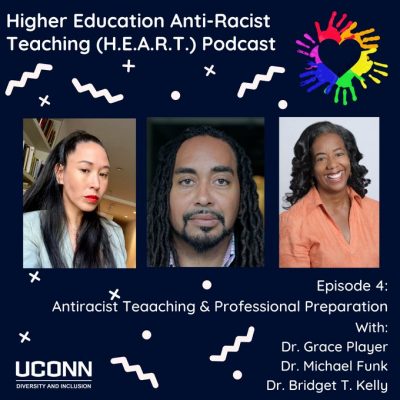
Grace Player co-published “Re-Imagining Literacy and Language Education for Girls of Color” and “‘We Are Our Only Way Forward’”: Dialogic Re-Imaginings and the Cultivation of Homeplace for Girls, Women, and Femmes of Color” for the April issue of Urban Education. She also published “’My Color of My Name’: Composting Critical Self-Celebration With Girls of Color Through a Feminist of Color Writing Pedagogy” for the February issue of Research in the Teaching of English and “People Get Mistaken: Asian American Girls Using Multiple Literacies to Defy Dominant Imaginings of Asian American Girlhood” for a recent issue of International Literacy Association. In March, Player was also featured on the Higher Education Anti-Racist Teaching (HEART) podcast. The podcast is co-hosted by Milagros Castillo-Montoya.
Joseph Renzulli published “Assessment for Learning: The Missing Element for Identifying High Potential in Low Income and Minority Groups” for the August issue of Gifted Education International. Renzulli was also recognized as No. 3 among the “World’s Top 30 Education Professionals for 2021” by Global Gurus.
Lisa Sanetti co-published a brief titled “Total Worker Health: A New Direction in Supporting Teacher Well-Being” for the UConn Collaboratory on School and Child Health (CSCH).
Del Siegle has been elected UConn’s 2021-22 Chair of the Senate Executive Committee. Siegle has served as a member of the Senate Faculty Standards Committee, chair and member of the Senate Nominating Committee, member of the Faculty Review Board, two terms as moderator of the Senate, and one term as the Senate parliamentarian. His term begins July 1. In addition, Siegle has been elected to serve as treasurer of the AERA’s Research on Giftedness, Creativity, and Talent Special Interest Group. His two-year term begins after the 2021 AERA Annual Meeting. He also published “When Pictures Are Worth a 1,000 Words: Addressing Global Stereotypes With Dollar Street” for the March issue of Gifted Child Today and presented at the California Association for the Gifted’s virtual Administrator Conference in March.
Tracy Sinclair was elected to the Board of Directors for the Connecticut Association of Applied Behavior Analysis (CT-ABA).
Stephen Slota hosted a virtual conversation in April titled “The Gay Agenda: The Power of History as Storytelling” for his courses DMD 3522: Interactive Storytelling and EPSY5266: Instructional Media and Game Design. The conversation also featured public historian Nuri Sherif. In March, Slota hosted a virtual discussion with Trent Hergenrader titled “Collaborative Worldbuilding for Writers and Gamers.” View a recording of the discussion. Slota also participated in a panel “Things Higher Education Should Know About Neurodivergence”: University of Glasgow Neurodivergence Celebration Week Panel Discussion” in March. Check out the event recording.
George Sugai and Sandra Chafouleas co-published an editorial titled “Reopening Schools Requires Doing Less, Better” for the CT Mirror.
Jaci VanHeest and Nneka Arinze, an alumna of the sport management program and Husky Sport program leader, are featured in a CSCH podcast episode titled “The Importance of Physical Activity on Wellness.”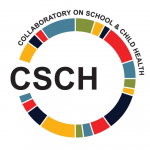
Jennie Weiner was featured in March by Harvard University’s EdCast on “Gender Matters: Challenges Facing Women in Education.” In addition, she moderated a virtual panel titled “Not Burnout, Betrayal: The Pandemic’s Impact on Working Mothers” in April. Read more about the event, hosted by UConn Alumni.
Students
Kathleen Connolly, a doctoral student in educational psychology, along with Sandra Chafouleas and others, authored a report titled “Dedication, Innovation, and Collaboration: A Mixed-Methods Analysis of School Meals in Connecticut During COVID-19” for the 2021 issue of Journal of Agriculture, Food Systems, and Community Development (JAFCD), featured by JAFCD in its e-newsletter in April.
Daron Cyr ’09 (ED), (CLAS), ’10 MA, a doctoral student in educational psychology, co-published with Jennie Weiner and Laura Burton “‘I Want to Speak to a White Person’: Daily Microaggressions and Resilient Leadership” for the March issue of Journal of Cases in Educational Leadership.
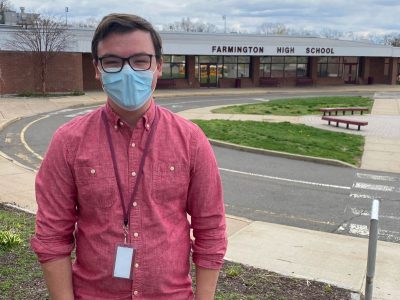
Kurt Daigle ’15 (CLAS), a second-year counseling student, was named Connecticut School Counseling Association’s Intern of the Year. Daigle will be recognized at an online ceremony at the end of May. He completed his internship at Farmington (Conn.) High, the same high school from which he graduated.
Susan Meabh Kelly, a doctoral student in curriculum and instruction, published “Digging for Data: Mining Geoscience Databases to Deepen and Expand STEM Learning Opportunities” for the May/June issue of The Science Teacher.
Alexandra Lamb, a doctoral student in educational leadership, co-published with Jennie Weiner “Technology as Infrastructure for Change: District Leader Understanding of 1:1 Educational Technology Initiatives and Educational Change” for the February issue of Journal of Educational Administration.
Mya Malaykhan, a UConn nursing student who has worked with Rebecca Campbell-Montalvo since Fall 2019 as a federal work-study research assistant on several Neag School research projects, has been accepted to the Research Experiences for Undergraduates summer program at the University of Georgia to work on biology education research.
T.J. McKenna, a doctoral student in curriculum and instruction, was featured by Boston University in a piece about preparing the next generation of science teachers.
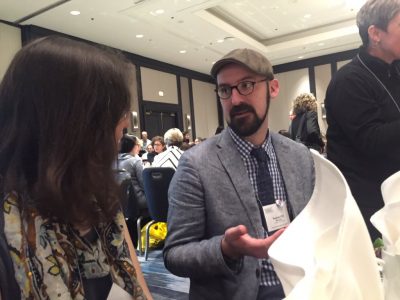
Jonathan Simmons ’09 (ED), ’11 MA, a doctoral student in curriculum and instruction, was appointed one of three new leadership team members for the Universitas 21 FINE, an international group of doctoral students and early-career researchers in education who collaborate on educational issues from a global perspective.
Alumni
Erika Bahler ’10 (CANHR), ’12 MA was a host for UConn Alumni’s Husky Plant Night, held virtually in March.This workshop provided information on when and how to plant seeds, type of soil, time to bloom, and related topics. View the recording. Bahler is the Agricultural Science and Technology Vernon Regional department head for plant science at Rockville (Conn.) High School and co-owner of Meadow Brook Farm in Ellington, Connecticut.
Paul Brenton ’06 6th Year, ’19 ELP was hired as superintendent for Plainfield (Conn.) Public Schools. He most recently served as the assistant superintendent for Killingly (Conn.) Public Schools.
Miguel Cardona ’01 MA, ’04 6th Year, ’11 Ed.D., ’12 ELP, the U.S. Secretary of Education, was a keynote speaker for the Education Writers Association’s National Seminar in May and the American Council on Education’s 2021 Conference in March. In addition, he served as UConn’s keynote speaker for the Class of 2021.
Beomyku Choi ’17 Ph.D. and Michael Young co-published “TPACK-L: Teachers’ Pedagogical Design Thinking for the Integration of Technology” for the April issue of Technology, Pedagogy, and Education.
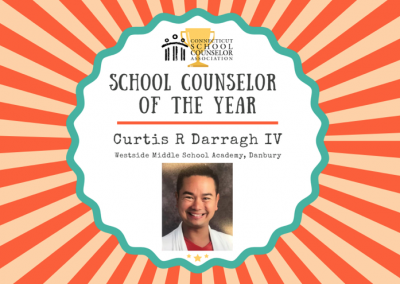
Curtis Darragh IV ’15 MA was recognized as School Counselor of the Year by the Connecticut School Counselor Association.
Alisha DiCorpo ’16 ELP was appointed superintendent for Milford (Conn.) Public Schools. She most recently served as the interim superintendent; before that, she was the district’s assistant superintendent for four years.
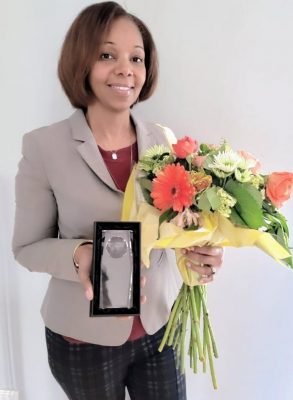
Roszena Haskins ’17 Ed.D., director of Equity Advancement for West Hartford (Conn.) Public Schools, was honored as a champion of equity at Connecticut’s State Education Resource Center (SERC) virtual conference in May.
Josue Lopez ’16 Ph.D. was the 2021 UConn Graduate School’s virtual Doctoral Commencement ceremony’s student speaker.
Erin Mason ’16 MA was hired as university register for Ball State University. She most recently served as UConn’s associate registrar.
Ty C. McNamee ’15 MA, a doctoral student at Teacher’s College, co-published “Spatial Inequity and Social Class: Suggestions for Supporting Rural Students Across Social Class Backgrounds” for the April issue of New Directions for Student Services.
Salvator Menzo ’96 MA, ’99 6th Year, ’08 Ed.D has been hired as superintendent of Goodwin University Magnet Schools, starting in July. He most recently served as superintendent of Wallingford (Conn.) Public Schools for 12 years.
Jacqueline Millisits ’18 (CLAS), ’18 (ED) co-published “Financial Well-Being of Sportswomen” for the March issue of International Journal of Sport Policy and Politics. She works as the integrated digital planner, global sales, and partnership marketing for World Wrestling Entertainment (WWE).
Uyi Osunde ’03 (CLAS), ’08 MA, ’20 Ed.D., a current student in the Executive Leadership Program, was appointed superintendent of Stratford (Conn.) Public Schools. He most recently served as Windsor (Conn.) High’s principal.
Noemi Maldonado Picardi ’02 (CLAS), ’21 Ed.D. was promoted to director of student services at UConn Avery Point. She most recently served as the interim director; before that, she was the associate director of advising.
Willena Kimpson Price ’20 Ph.D., director of UConn’s African American Cultural Center, was a finalist for UConn’s Inclusive Excellence Award.
Lisa (Deorio) Wolak ’82 (CLAS), ’99 ELP, ’02 6th Year was appointed superintendent of Weston (Conn.) Public Schools, starting July 1. Her most recent position was Weston High’s principal.
Koichi Yoshikawa ’12 MA, ’14 6th Year, ’14 Ph.D. co-authored with Thomas Kehle; Melissa Bray; Marisa del Campo ’11 MA, ’15 6th Year, ’20 Ph.D.; Johanna deLeyer-Tiarks ’17 MA, ’20 6th Year, ’20 Ph.D.; Neag School doctoral student Emily Louise Winter; and Natalie Starling ’06 (CLAS), ’15 Ph.D. “Self-Distancing to Reduce Anger in High School Students” for the March issue of International Journal of School and Educational Psychology.
In Memoriam
Jerome “Jerry” Auclair ’91
Donald P. Bellizzi ’75
Raymond E. Bryant ’82
Barbara J. Croskey ’68
Alan R. Curtis ’78
Estelle L. Duggan ’61
John T. Flynn, Professor Emeritus of Educational Psychology
Amanda Higgins ’21
Michael A. McGuire ’69
Louise C. Muzin ’72
Kenneth “Ken” J. Sullivan ’68
Richard R. Teller ’63
Richard L. Thompson ’82
Sheila N. Williams ’55
George A. Wilson ’69
Congratulations to our Neag School alumni, faculty, staff, and students on their continued accomplishments inside and outside the classroom. If you have an accolade to share, we want to hear from you! Email us any news items or story ideas.
